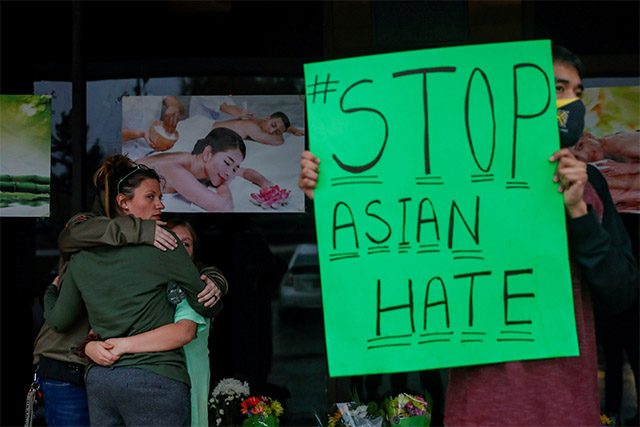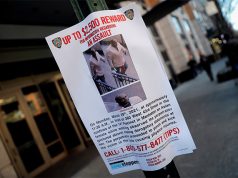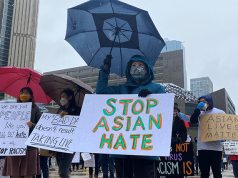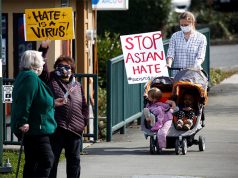
ATLANTA — Before the COVID-19 pandemic began last year, Kyung Cho noticed people sometimes gave him odd looks or asked if he spoke English.
These days, Cho said, attitudes toward Asian-Americans like him have become far more hostile.
“It’s gotten worse,” the 50-year-old handyman said as he shopped at an Asian grocery store in an Atlanta suburb on Wednesday. “The other day I was in a parking lot and some kid shouted for me to go back to China. I’m from Korea.”
Across the United States, many Asian-Americans reeled at the news of a shooting spree at three spas in and around Atlanta on Tuesday night that left eight people dead, including six Asian women. Authorities said the 21-year-old white male suspect told them he had a sex addiction and that the attacks may not have had a racial motivation.
But after a year in which reports of hate crimes against Asian Americans have skyrocketed, the shooting sparked fresh outrage, fear and demands for a government response.
“We’re besieged,” said Russell Jeung, a professor of Asian American Studies at San Francisco State University and a founder of Stop AAPI Hate, a coalition that has tracked anti-Asian violence during the pandemic. “The overall community is traumatized.”
In a report released on Tuesday before the shooting, the coalition said it received 3,795 reports of hate incidents between March 2020 and February 2021. The majority of the discrimination consisted of verbal harassment and shunning, with women reporting incidents about two times more often then men.
A study published earlier this month by the Center for the Study of Hate and Extremism, a nonpartisan research center, showed that reported hate crimes against Asian Americans in 16 major U.S. cities rose by 149% from 2019 to 2020, while overall hate crimes dropped 7% in the same time period.
Advocates for the community say the surge is largely the result of Asian Americans being blamed for the coronavirus, which was first identified in Wuhan, China in late 2019. Former U.S. President Donald Trump repeatedly referred to COVID-19 as the “China Virus” and “kung flu,” rhetoric seen by some as inflaming anti-Asian sentiment.
A Reuters/Ipsos poll of 4,430 Americans, conducted from Feb. 18-24, showed that 37% believed that COVID-19 was created in a lab in China, including 24% of Democrats and 54% of Republicans. Researchers are still trying to identify the origins of the virus, but there is no credible evidence to suggest it was accidentally released from a Chinese lab.
Lily Huynh, 24, said she was upset by the deaths of the women in Georgia.
She said she has increasingly worried that her mother, an immigrant from Vietnam who owns a nail salon in Mesquite, Texas, might be targeted due to her heavy accent and nationality.
“You think about these women, and you recognize your own mother could have been them,” Huynh said.
Asian-American leaders on Wednesday called for government officials to do more to protect and support their communities, and the hashtag #StopAsianHate circulated widely on social media. A U.S. House of Representatives committee planned a hearing for Thursday to address the issue.
“Asian Americans are afraid to leave their homes, and not just because of disease. They’re afraid to leave their homes because there’s a real risk, just walking down the street minding your own business, that you’ll be blamed for a global pandemic and that people will come after you,” said Frank Wu, the president of Queens College, City University of New York, who studies anti-Asian discrimination in the United States.
Almost half of the anti-Asian hate incidents recorded by Stop AAPI Hate occurred in California, where Asian Americans make up some 15% of the population.
Ronald Lisam, a 45-year-old Chinese-American who was grocery shopping in San Francisco’s Chinatown on Wednesday, said he has started to question his safety in public.
“Every day I’m worried about being attacked, robbed, assaulted,” he said.
—Reporting by Rich McKay in Atlanta and Gabriella Borter in Washington Additional reporting by Alexandra Ulmer in San Francisco and Chris Kahn in New York Editing by Colleen Jenkins and Rosalba O’Brien








